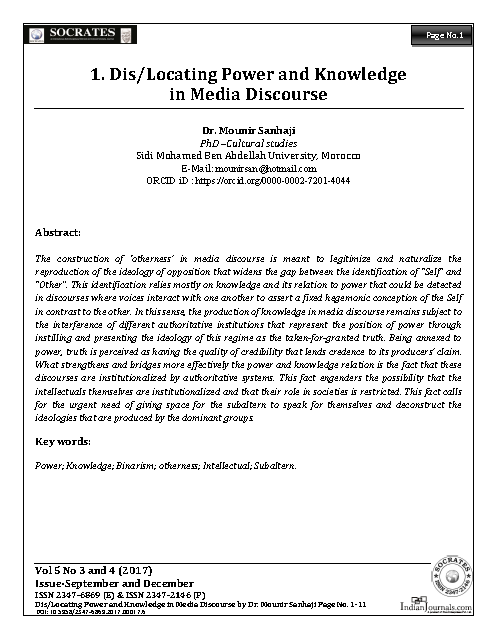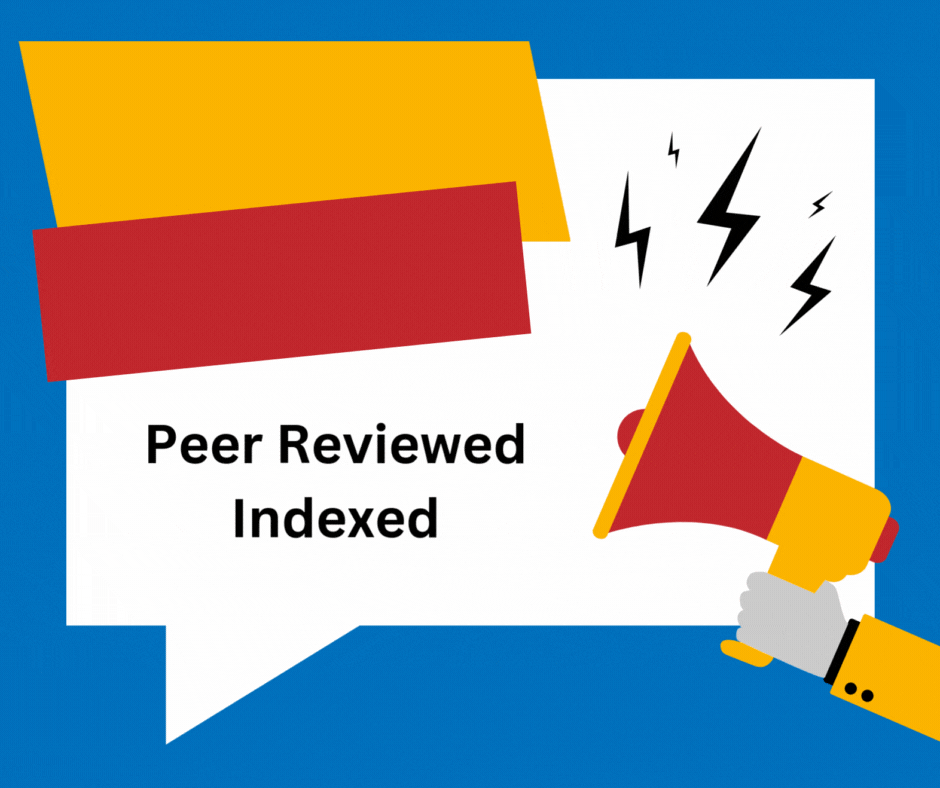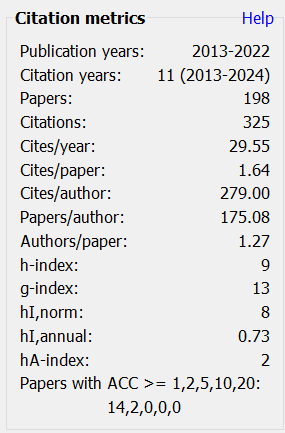Dis/Locating Power and Knowledge in Media Discourse
DOI:
https://doi.org/10.5958/2347-6869.2017.00017.6Keywords:
Power, Knowledge, Binarism, otherness, Intellectual, SubalternAbstract
The construction of ‘otherness’ in media discourse is meant to legitimize and naturalize the reproduction of the ideology of opposition that widens the gap between the identification of “Self” and “Other”. This identification relies mostly on knowledge and its relation to power that could be detected in discourses where voices interact with one another to assert a fixed hegemonic conception of the Self in contrast to the Other. In this sense, the production of knowledge in media discourse remains subject to the interference of different authoritative institutions that represent the position of power through instilling and presenting the ideology of this regime as the taken-for-granted truth. Being annexed to power, truth is perceived as having the quality of credibility that lends credence to its producers’ claim. What strengthens and bridges more effectively the power and knowledge relation is the fact that these discourses are institutionalized by authoritative systems. This fact engenders the possibility that the intellectuals themselves are institutionalized and that their role in societies is restricted. This fact calls for the urgent need of giving space for the subaltern to speak for themselves and deconstruct the ideologies that are produced by the dominant groups.
DOI: 10.5958/2347-6869.2017.00017.6
Downloads
Metrics
References
Ashcroft, B., Griffiths, G., & Tiffin, H. (1998). Key Concepts in Post-colonial Studies. London: Routledge.
Bakhtin, M. (1981). The Dialogic Imagination: Four Essays. (C. Emerson, & M. Holquist, Trans.) Austin: University of Texas Press.
Bulbeck, C. (1997). Fracturing Binarisms: First and Third Worlds. In C. Bulbeck, Re-Orienting Western Feminisms: Women's Diversity in a Postcolonial World (pp. 18-56). Cambridge: Cambridge University Press.
Byrne, E. (2009). Transitions: Homi. K. Bhabha. New York: Palgrave Macmillan.
Foucault, M., & Rabinow, P. (1994). Ethics: Subjectivity and Truth. (R. Hurley, Trans.) New York: The New Press.
Giroux, H. A. (1994). Benetton's `World Without Borders': Buying Social Change. In C. Becker, The Subversive Imagination: Artists, Society, and Social Responsibility. New York: Routledge.
Gramsci, A. (1971). The Prison Notebooks: Selections. (Q. Hoare, & G. Nowell-Smith, Trans.) New York: International Publishers.
Kellner, D. (1995). Media Culture: Cultural Studies Identity and Politics Between the Modern and the Postmodern. London: Routledge.
Miller, S. (1990). Foucault on Discourse and Power. A Journal of Social and Political Theory(76). Retrieved May 2014, 5, from http://www.jstor.org/stable/41801502
Oesterheld, C. (n.d.). Humor and Satire: Precolonial, Colonial and Postcolonial. The Annual of Urdu Studies(26).
Pötzsch, H. (2011). Borders, Barriers and Grievable Lives: The Discursive Production of Self and Other in Film and Other Audio-Visual Media. Nordicom Review, 32(2).
Raden, M. (1998). The Power of Discourse and the Discourse of Power: Shem Tov's Proverbios Morales. Revista Canadiense de Estudios Hispánicos, 22(3).
Radhakrishnan, R. (1990). Toward an Effective Intellectual: Foucault or Gramsci? In B. Robbins, Intellectuals: aesthetics, politics, academics (pp. 57-99). Minneapolis: University of Minnesota Press.
Said, E. (1993). Culture and Imperialism. New York: Vintage Books.
Said, E. W. (1978). Orientalism. New York: Vintage Books.
Schneck, S. F. (1987). Michel Foucault on Power/Discourse, Theory and Practice. Human Studies, 10(1).
Spivak, G. C. (1988). Can the Subaltern Speak? In C. Nelson, & L. Grossberg (Eds.), Marxism & The Interpretation of Culture. London: Macmillan.

Downloads
Published
How to Cite
Issue
Section
License
Copyright (c) 2018 Sanhaji Mounir

This work is licensed under a Creative Commons Attribution-NonCommercial 4.0 International License.
Revised Copyright/CC license that applies to all the articles published after 05-02-2017
Attribution-NonCommercial 4.0 International (CC BY-NC 4.0)

Copyright/CC license that applies to all the articles published before 05-02-2017
Attribution-Non Commercial-No Derivatives 4.0 International (CC BY-NC-ND 4.0)

Author(s) will retain all the right except commercial and re-publishing rights. In the case of re-publishing, they will have to obtain written permission from the journal. Additional licensing agreements (Creative Commons licenses) grants rights to readers to copy, distribute, display and perform the work as long as you give the original author(s) credit, they can not use the works for commercial purposes and are not allowed to alter, transform, or build upon the work. For any reuse or distribution, readers and users must make clear to others the license terms of this work. Any of these conditions can be waived if you get permission from the copyright holders. Nothing in this license impairs or restricts the authors’ rights. To view a copy of this license, visit http://creativecommons.org/licenses/by-nc-nd/4.0/ or send a letter to Creative Commons, 171 Second Street, Suite 300, San Francisco, California, 94105, USA.
Research Papers published in SOCRATES are licensed under an Attribution-NonCommercial-NoDerivatives 4.0 International (CC BY-NC-ND 4.0)
















